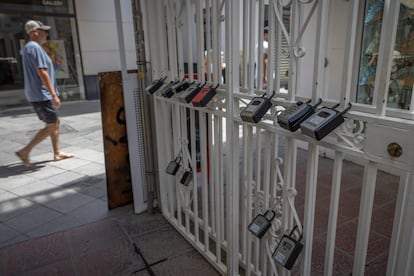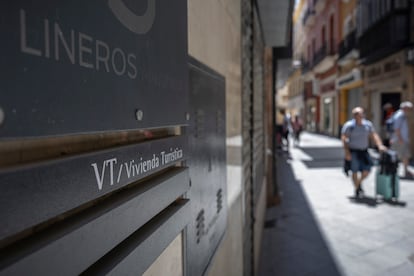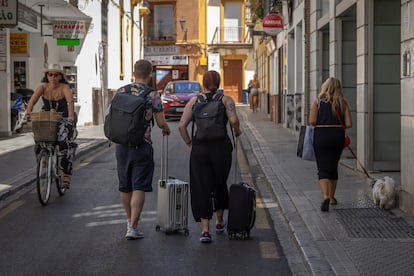Seville to cut off water supply to around 5,000 irregular tourist apartments
The opposition has called the move a publicity stunt, pointing out that it will take a decade to inspect all suspected homes, given only 10 dwellings are inspected a week


The Seville City Council will cut off the water supply to around 5,000 illegal tourist apartments that operate in the Spanish city without a license or that do not comply with the regulations, according to municipal estimates. The local government wants to stop the spread of irregular holiday apartments and plans to shut down an estimated 5,000 homes — a figure reached after cross-checking data with the rental technology platforms.
However, the opposition argues that the measure is a publicity stunt, pointing out that the City Council — which is led by a minority government of the conservative Popular Party (PP) — refused a plan to stop issuing new VUT licenses that allow homes to be used for tourism purposes. What’s more, the local government is aiming to inspect just 10 irregular tourist apartments a week. If this pace does not rise with new inspectors, it will take nearly a decade to check all 5,000 homes.
“These 5,000 irregular dwellings include those registered in the municipal register and which do not comply with the obligation to be on the ground or first floor, or certain design conditions, and homes that are not registered, but operate in the market. We are cross-referencing data with the platforms and the analysis will determine the tourism stress of each neighborhood,” sources from the Seville Urban Planning Department told EL PAÍS.
The City Council will first target the 715 apartments that, according to the land registry and the cadaster, are located above the first floor, and therefore do not comply with urban planning regulations, as reported by the Spanish news website El Diario.
Seville is the capital of the Spanish region of Andalusia, which has the highest number of tourist rentals in all of Europe: 117,000 homes and 620,000 rooms. Complaints from residents about the problems caused by mass tourism have skyrocketed this year amid the record numbers of visitors, and politicians are trying to take note.

The Mayor of Seville, José Luis Sanz, praised the plan on Monday: “We will act with zero tolerance towards tourist apartments that operate irregularly. More control and more firmness in sanctions to put an end to illegal apartments in Seville after years of looking the other way.”
The City Council says that it top priority is to tackle the problem in the center of Seville and the Triana neighborhood, the two main tourist hubs which have been hit hard by the surge in tourist accommodation.
But Seville Citizens’ Initiative — a platform that fights against mass tourism in the Andalusian capital — say the plan does not address the root causes of the problem. “With 10 licenses being checked a week, how many years will it take to eradicate illegal housing? The crux of the matter is no longer illegal or legal apartments: the entire city and the political opposition are clamoring for a moratorium on issuing a single license more. And until [the City Council] takes this measure, everything else is just a smokescreen to cover up the problem,” David López, the spokesperson of the initiative, told EL PAÍS.
Before advancing this plan to tackle illegal housing, Mayor Sanz tried to pass a proposal to limit the number of homes to be used for tourism. But the opposition voted against it, arguing that it did not go far enough. The City Council planned to limit tourist accommodation to 10% of the total number of available homes, which would stop the rise in vacation rentals in the already-overwhelmed historic center and Triana, but allow them to continue to spread in the rest of the city.
Last January, the Andalusian regional government approved a decree to regulate the 117,000 homes in the region, leaving it up to the local councils to limit or prohibit tourist apartments. There are 9,384 such tourist apartments in Seville.

The opposition has also cast doubt on the legality of the cutting off the water supply to a tourist apartment with a valid legal contract and its bills paid on time. “You can’t cut off the water just like that,” said Francisco Páez, from the Spanish Sociality Party (PSOE).
But the City Council maintains that cutting off water to illegal flats is supported by the municipal and regional legal services, and is hopeful that it will have a deterrent effect, arguing the number of homes to inspect will quickly fall once the inspections begin.
Sign up for our weekly newsletter to get more English-language news coverage from EL PAÍS USA Edition
Tu suscripción se está usando en otro dispositivo
¿Quieres añadir otro usuario a tu suscripción?
Si continúas leyendo en este dispositivo, no se podrá leer en el otro.
FlechaTu suscripción se está usando en otro dispositivo y solo puedes acceder a EL PAÍS desde un dispositivo a la vez.
Si quieres compartir tu cuenta, cambia tu suscripción a la modalidad Premium, así podrás añadir otro usuario. Cada uno accederá con su propia cuenta de email, lo que os permitirá personalizar vuestra experiencia en EL PAÍS.
¿Tienes una suscripción de empresa? Accede aquí para contratar más cuentas.
En el caso de no saber quién está usando tu cuenta, te recomendamos cambiar tu contraseña aquí.
Si decides continuar compartiendo tu cuenta, este mensaje se mostrará en tu dispositivo y en el de la otra persona que está usando tu cuenta de forma indefinida, afectando a tu experiencia de lectura. Puedes consultar aquí los términos y condiciones de la suscripción digital.








































